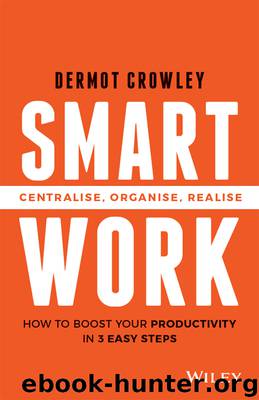Smart Work by Dermot Crowley

Author:Dermot Crowley
Language: eng
Format: epub
Publisher: Wiley
Published: 2015-10-26T00:00:00+00:00
* * *
Check email proactively
Build a proactive routine around checking emails.
Email was designed as an asynchronous communication tool. This means you can send the email and the recipient can read it at a different time. Meetings, phone calls and conversations are examples of synchronous communications. They happen simultaneously for all involved. The power of email is in the fact that we can deal with incoming work in our own time. But increasingly over the past decade email has morphed into a synchronous communication tool. The sender now often expects that you will read their email and respond to it immediately.
If you have made the smart move and turned off your email alerts, you will need to proactively review and process any mail that has arrived since you last checked. Building a proactive routine around your email helps you to maintain a healthy balance between being responsive and focusing on your current priorities. Your incoming emails have the potential of becoming future priorities in your schedule, but they should not always jump to the head of the queue in front of your current work. When is the best time to do this? How often should you check?
How frequently you check emails will depend on your role. Some roles do require a constant awareness of what is coming in and, for many emails, immediate action. But be careful before you let yourself off the hook here — these roles are few and far between. Most workers and managers do not need to check email constantly to do their job effectively. They only like to think they do because it brings a sense of control into what often feels like an out-of-control environment. New email also generates a feeling of excitement in an otherwise routine day. Maybe there's good news, maybe bad news — any news is more interesting than the report you are working on!
One strategy to break this cycle of reactive email-checking is to build a proactive routine and communicate your intentions to those around you. Firstly, you need time to properly process your emails each day. Without this the volume will build up and you will fall behind. Aim to put aside two, maybe three blocks of time during each day to process your emails. First thing in the morning and late in the afternoon are ideal times, with maybe a slot at lunchtime if necessary. I believe you can get by quite comfortably with two processing times each day, especially if you have reduced the noise in your inbox and are decisive when processing. The main aim when processing your emails during this time is to make decisions about what needs to happen with each email, and we will cover this when we discuss processing in the feature at the end of Part II.
Outside of these processing times, I recommend a five-minute check of your emails about once per hour. This can be done between meetings, or on completion of a task, and should involve no more than a quick check to deal with anything urgent, and maybe delete and file a few emails.
Download
This site does not store any files on its server. We only index and link to content provided by other sites. Please contact the content providers to delete copyright contents if any and email us, we'll remove relevant links or contents immediately.
| Bookkeeping | Business Mathematics |
| Business Writing | Communications |
| Decision Making | Negotiating |
| Project Management | Running Meetings & Presentations |
| Secretarial Aids & Training | Time Management |
| Training |
Nudge - Improving Decisions about Health, Wealth, and Happiness by Thaler Sunstein(7707)
Deep Work by Cal Newport(7085)
Principles: Life and Work by Ray Dalio(6449)
The Doodle Revolution by Sunni Brown(4761)
Factfulness: Ten Reasons We're Wrong About the World – and Why Things Are Better Than You Think by Hans Rosling(4742)
Eat That Frog! by Brian Tracy(4540)
Thinking in Bets by Annie Duke(4227)
Hyperfocus by Chris Bailey(4118)
Visual Intelligence by Amy E. Herman(3782)
Writing Your Dissertation in Fifteen Minutes a Day by Joan Bolker(3729)
Ogilvy on Advertising by David Ogilvy(3622)
Hidden Persuasion: 33 psychological influence techniques in advertising by Marc Andrews & Matthijs van Leeuwen & Rick van Baaren(3565)
How to Win Friends and Influence People in the Digital Age by Dale Carnegie & Associates(3562)
How to win friends and influence people by Dale Carnegie(3474)
The Pixar Touch by David A. Price(3439)
Schaum's Quick Guide to Writing Great Short Stories by Margaret Lucke(3381)
Deep Work: Rules for Focused Success in a Distracted World by Cal Newport(3237)
Work Clean by Dan Charnas(3123)
The Slow Fix: Solve Problems, Work Smarter, and Live Better In a World Addicted to Speed by Carl Honore(3009)
